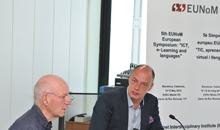Current events
News
The 5th EUNoM European Symposium, organised by the UOC, spent two days analysing the role of universities in a society that is increasingly multilingual, globalised and technological, and facing the challenge of adapting to ICTs and providing students with the right tools. The symposium brought together academics from fourteen countries and focused on language e-learning and how ICTs can help overcome both linguistic and cultural barriers.
The symposium was opened by Teresa Sancho, UOC Vice President for Research and Innovation, and Miquel Strubell, the project’s coordinator and Director of the UOC Chair in Multilingualism. Sancho highlighted the work done to date by the UOC in introducing a learning model that focuses on the student and their needs. This system is based on the use of ICTs and a language model which, since the start, has been committed to multilingualism. The Vice President stated that “we need to encourage the studying of two languages, alongside Spanish and Catalan, from a very early age” in order to “guarantee that our youngsters can make progress and gain a full command of the communication tools. If not, they will find that many doors will have been closed to them.”
The use of new technologies for education
The symposium also offered the chance to debate the impact of new technologies and communication media in language learning. Internet guru and lecturer at the Estonian Information Technology College Linnar Viik opened the session of keynotes and presentations. Viik, who has applied his expertise with ICTs to language learning and the modernisation of the university as an institution, said that “we have to learn from failure, because success makes us blind” and “move towards a technology that is at the service of education”. Likewise, Norbert Pachler, Professor of Education and Director of International Teacher Education at the University of London’s Institute of Education, said that “mobile learning has become a new way to understand learning,” given that social network-style applications to share photographs and experiences can also let people share the cultural nuances of different languages. Pachler went on to say that “the potential of these devices and all their features can be of great use”.
The presence of minority languages in a globalised context
The symposium also involved MEP Maria Badia, who praised the work undertaken by the researchers and reiterated the need for “investment in the education-research-innovation triangle, as this is the catalyst for prosperity”.
UOC lecturers Montserrat Vall-llovera and Maite Puigdevall gave details on their experience of using a multilingual virtual campus for the Management of Linguistic and Cultural Diversity postgraduate course. Despite the fact that it is a multilingual course, it has a virtual campus in Catalan because “it looks at the challenges for Catalan in terms of other languages in the world and the surrounding territory,” explained Puigdevall. She also revealed the intention to internationalise the course and “make more intensive use of English and French in the classes”.
Overcoming barriers both in the virtual and real worlds
The second day looked at the use of new technologies to incentivise language students and teachers. Sònia Prats, a lecturer from the Autonomous University of Barcelona, presented the advances made at the university’s Language Service in adapting e-learning to language learning. Prats said that, though ICTs can aid assimilation of languages, “it is the job of the teachers to integrate these new technologies into their classes”.
The president of Clusterlingua, Tenesoya Pawlowsky, analysed the potential of the translation sector in her presentation of the experience of this cluster which brings together Catalan translation companies and which aims to make Barcelona a point of reference for multilingualism and multiculturalism.
Daniel Cunliffe, from the Department of Computing and Mathematical Sciences at the University of Glamorgan, Wales, closed the symposium. He highlighted the debate seen over the two days and the different lines of action that each of the participants had presented in terms of ICT-mediated language learning. Cunliffe invited everyone to “break down the current barriers” and “stop seeing virtual systems as not real”. In his opinion, it is key that ICTs be adapted to students’ actual needs because “we want individuals who are able to interact not only in a virtual multilingual world, but in a real one too”.
The EUNoM project
The UOC Chair in Multilingualism coordinates the EUNoM project which aims to provide guidance on the modernisation of the university sector, both in terms of academic and organisational issues, prioritising multilingualism and multiculturalism as strategic values and challenges.
The EUNoM project received funding for a three-year period from November 2009 to October 2012 from the European Union’s Lifelong Learning programme to organise a series of activities and forums for discussion, such as this symposium. At the end of this period, the project’s conclusions will be made public at a final conference to take place at the European Parliament.




